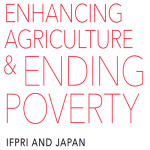IFPRI’s wide range of partnerships in Bangladesh have influenced the design and operation of large-scale national programs and provided real-time policy analysis during times of crisis. The country’s commitment to using research to guide policy decisions has helped to foster a culture of evaluation that can truly have an impact on hunger and malnutrition.
A Win for Women
On March 8, 2019, the world celebrates International Women’s Day—a day dedicated to raising awareness on the importance of achieving gender parity in the working world. To understand women’s role in agriculture and to close the gender gap in agricultural production, the International Food Policy Research Institute’s (IFPRI) research has been examining gender differences within rural households and communities for over 25 years.
Enhancing nutrition and ending poverty: IFPRI and India
IFPRI’S Partnership with India began more than 40 years ago. Throughout the years, IFPRI has collaborated with the Government of India to tackle the most-relevant issues from rural development in the 70s to an expanded set of current issues such as nutrition, climate change, and value chains.
Enhancing agriculture and ending poverty: IFPRI and Japan
For more than 30 years, Japan has partnered with IFPRI in Africa and Asia, providing support for areas of shared concern—from agricultural modernization to capacity strengthening to nutrition. Evidence from IFPRI research, which has benefited from long-term Japanese support, has influenced policies in the countries of research and informed Japan’s investments in development.
Empowering women, enhancing nutrition, and ending poverty: IFPRI and Canada
IFPRI’s long-standing partnership with Canada has generated cutting-edge research in support of improved food security and nutrition, particularly for women and children, and gender equity, and IFPRI looks forward to continuing to work together to end hunger and malnutrition.
Ending poverty & hunger: IFPRI and the Bill & Melinda Gates Foundation
Launched in 2003, IFPRI’s partnership with the Bill & Melinda Gates Foundation has brought us many steps closer to our shared vision of a world free of hunger and malnutrition, where, in the words of Bill and Melinda Gates, “all lives have equal value.” This report highlights the progress we have made together, as we work to end hunger and poverty, a goal that we both agree is within reach.
Transform Nutrition & LANSA: Improving Nutrition with Regional Alliances
Transforming whole food systems for nutrition requires wide-reaching alliances of stakeholders from multiple sectors. Recognizing this, DFID funded Transform Nutrition (TN), a large consortium led by IFPRI that is producing research on nutrition-specific and nutrition-sensitive interventions (such as agriculture, social protection, and women’s empowerment) in specific regions around the world. The TN consortium, a six-year >> Read more
Innovations in Index Insurance: Weathering the Storm
With support from DFID and other donors beginning in 2010, IFPRI assessed how to improve the potential of index insurance to enhance the resilience of smallholder farmers. Risk is part of everyday life for many of the world’s poorest households, and uninsured risks can pose considerable costs to current and future welfare. Thus, the lack >> Read more
Highlights IFPRI and USAID partnership: Reducing poverty and hunger through food policy research
For four decades, the longstanding collaboration between the United States Agency for International Development (USAID) and the International Food Policy Research Institute (IFPRI) has been crucial to helping developing countries attain agriculture-led economic growth. The innovative programs and strong evidence base produced through this partnership have contributed to transforming policies and investments for improved food >> Read more
Preventive versus Recuperative Nutritional Intervention Approach
In the early 2000s, the joint work of USAID, the USAID- funded Food and Nutrition Technical Assistance (FANTA) project, and IFPRI influenced the global approach to nutrition interventions. Traditionally, nutrition programs administered interventions to children under age five only after they became undernourished—the recuperative approach. Although new scientific evidence was surfacing that children under the >> Read more
- 1
- 2
- 3
- …
- 22
- Next Page »











